Montréal-Django
Introduction to Coding Principles, Unit Testing and Mocking in Django

https://slides.com/ctrlweb/django-3/live
Welcome
Daniel LeBlanc
CEO at ctrlweb
@danidou

https://ca.linkedin.com/in/dleblanc78
YulDev Organizer
Montréal-Django Organizer

daniel@ctrlweb.ca
Job Offers
Job Seekers
Tonight's Objectives
- Key principles
- The Tester's Mantra
- The methodologies
- Mocking
This is an
introductory
talk
Key Principles
“ The intelligent have plans; the wise have principles. ”
- Raheel Farooq
DRY
Don't Repeat Yourself
"Every piece of knowledge must have a single, unambiguous, authoritative representation within a system."
KISS
Keep it simple, stupid
"Most systems work best if they are kept simple rather than made complicated; therefore simplicity should be a key goal in design and unnecessary complexity should be avoided."
YAGNI
You aren't gonna need it
"Always implement things when you actually need them, never when you just foresee that you need them."
SOLID
- single responsibility
- open-closed
- Liskov substitution
- interface segregation
- dependency inversion
Single responsibility
A class should have only a single responsibility.
Single responsibility
class BlogPost(models.Model):
title = models.CharField(max_length=255)
body = models.TextField()
slug = models.SlugField()
author = models.ForeignKey(User, related_name='posts')
create_date = models.DateTimeField(auto_now_add=True)
modified_date = models.DateTimeField(auto_now=True)
publish_date = models.DateTimeField(null=True)
Traditional, "fat" model
Single responsibility
from .behaviors import Authorable, Permalinkable, Timestampable, Publishable
class BlogPost(Authorable, Permalinkable, Timestampable, Publishable, models.Model):
title = models.CharField(max_length=255)
body = models.TextField()Compositional model
Single responsibility
class Authorable(models.Model):
author = models.ForeignKey(User)
class Meta:
abstract = True
class Permalinkable(models.Model):
slug = models.SlugField()
class Meta:
abstract = True
class Publishable(models.Model):
publish_date = models.DateTimeField(null=True)
class Meta:
abstract = True
[...]Reusable behaviours
Open/closed
Software entities should be opened to extension, but closed to modification.
Open/closed
In dynamic languages (such as Python), this is done by leveraging duck typing
Open/closed
Example: "QuackFlap" problem
for x in range(1, 46):
if x % 3 == 0 and x % 5 == 0:
print("Quack! *Flap*")
elif x % 5 == 0:
print("Quack!")
elif x % 3 == 0:
print("*Flap*")
else:
print(x)
Open/closed
class QuackFlapFactory:
def create():
rules = [QuackFlapRule(), FlapRule(), QuackRule(), NormalRule()]
return QuackFlap(rules)
create = staticmethod(create)
class QuackFlap:
def __init__(self, rules):
self.rules = rules
def say(self, x):
for rule in self.rules:
if rule.is_handled(x):
return rule.say(x)
class Rule:
def is_handled(self, x):
pass
def say(self, x):
pass
Example: "QuackFlap" problem with OCP
Open/closed
class NormalRule(Rule):
def is_handled(self, x):
return True
def say(self, x):
return x
class QuackRule(Rule):
def is_handled(self, x):
return x % 3 == 0
def say(self, x):
return "Quack!"
class FlapRule(Rule):
def is_handled(self, x):
return x % 5 == 0
def say(self, x):
return "*Flap*"
Example: "QuackFlap" problem with OCP
Open/closed
class QuackFlapRule(Rule):
def is_handled(self, x):
return x % 5 == 0 and x % 3 == 0
def say(self, x):
return "Quack! *Flap*"
if __name__ == '__main__':
quack_flap = QuackFlapFactory.create()
for i in range(1, 46):
print(quack_flap.say(i))
Example: "QuackFlap" problem with OCP
Liskov substitution
Objects in a program should be replaceable with instances of their subtypes without altering the correctness of that program.
Liskov substitution
Bad Example
def can_quack(animal):
if isinstance(animal, Duck):
return True
elif isinstance(animal, Snake):
return False
else:
raise RuntimeError('Unknown animal!')
if __name__ == '__main__':
print(can_quack(Duck()))
print(can_quack(Snake()))
print(can_quack(Elephant()))Liskov substitution
Better Example
def can_quack(animal):
return animal.can_quack()
class Animal(object):
def can_quack(self):
pass
class Duck(Animal):
def can_quack(self):
return True
class Snake(Animal):
def can_quack(self):
return False
if __name__ == '__main__':
print(can_quack(Duck()))
print(snake.can_quack(Snake()))Interface Segregation
Many client-specific interfaces are better than one general-purpose interface
Interface Segregation
The good news is: with duck typing, this is implicit.
Dependency Inversion
One should depend upon Abstractions, and not upon concretions.
Dependency Inversion
Bad Example
class Airline:
def book(self, origin, destination, date):
pass
class FlightBooker:
def __init__(self, starting_point, destination):
self.airline = Airline()
self.origin = starting_point
self.destination = destination
def book_two_way(self, start_date, return_date):
# Note: the definition for Airline.book is Airline.book(from, to, date)
self.airline.book(self.origin, self.destination, start_date)
self.airline.book(self.destination, self.origin, return_date)
def book_one_way(self, date):
self.airline.book(self.origin, self.destination, date)
Dependency Inversion
Better Example
class FlightBooker:
def __init__(self, airline, origin, destination):
self.airline = airline
self.origin = origin
self.destination = destination
def book_two_way(self, start_date, return_date):
# Note: the definition for Airline.book is Airline.book(from, to, date)
self.airline.book(self.origin, self.destination, start_date)
self.airline.book(self.destination, self.origin, return_date)
def book_one_way(self, date):
self.airline.book(self.origin, self.destination, date)
The Tester's Mantra
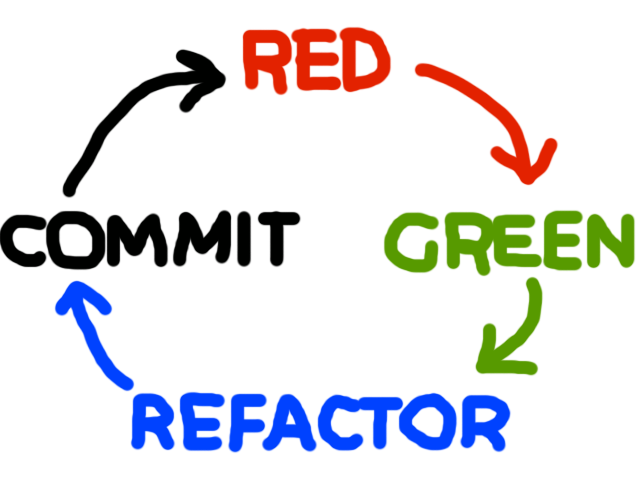
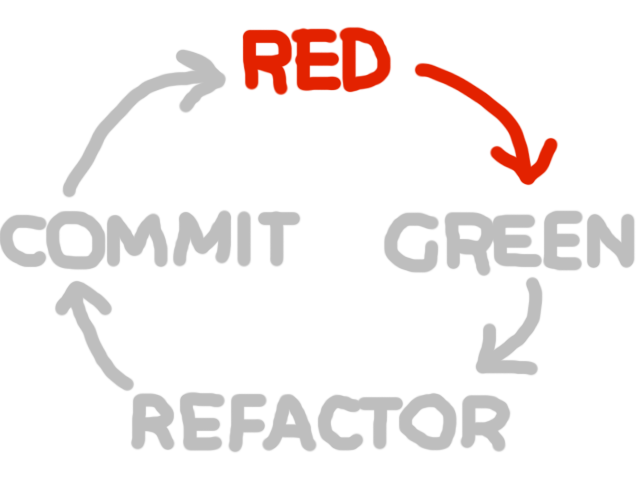
WRITE THE TEST
WRITE CODE WHICH
PASSES THE TEST
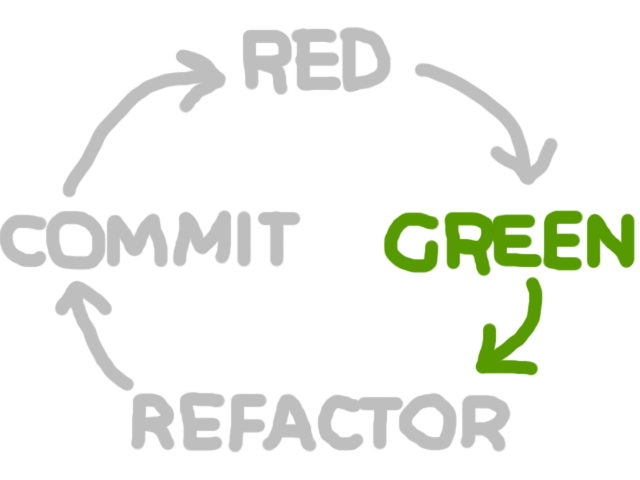
MAKE SURE ALL TESTS PASS &
REFACTOR SOME CODE
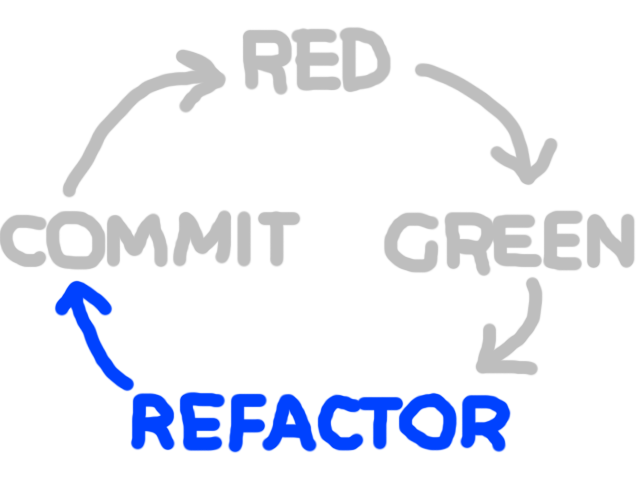
COMMIT CHANGES
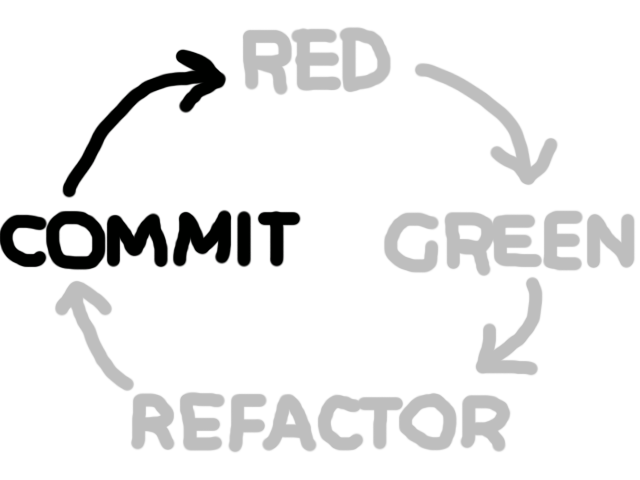
Test Driven Development
(TDD)
“ Code without tests is broken as designed. ”
- Jacob Kaplan-Moss
What is it?
A software development process that relies on the repetition of a very short development cycle:
- write a unit test that defines a desired improvement or new function
- produce the minimum amount of code to pass that test
- refactor the new code to acceptable standards
- commit it
As a dev
- More robust code
- Simpler designs
- Breaks negative feedback loop
- Less time debugging
- Happiness
As a manager
- Compatible with agile project management
- Maintains a constant cost of change
- Happiness
Benefits
< DRY KISS!
< SOLID!
"Traditional" project

TDD/Agile project

As a dev
- Risk of "blind spots" in tests / code (unless peer reviewed)
- Doesn't fully cover functional tests (user interface, db, network, etc.)
As a manager
- Slower pace at the beginning
- Organizational support crucial to TDD application
- Quality of tests crucial to maintenance overhead costs
Cons
Six steps
- Add a test
- Run all tests and see if the new one fails
- Write some code
- Run test
- Refactor code
- Commit
(Rinse and repeat)
Step 1 - Add a test
from django.test import TestCase
from myapp.models import Animal
class AnimalTestCase(TestCase):
def setUp(self):
Animal.objects.create(name="lion", sound="roar")
Animal.objects.create(name="cat", sound="meow")
def test_animals_can_speak(self):
"""Animals that can speak are correctly identified"""
lion = Animal.objects.get(name="lion")
cat = Animal.objects.get(name="cat")
self.assertEqual(lion.speak(), 'The lion says "roar"')
self.assertEqual(cat.speak(), 'The cat says "meow"')< Creates test data
< Tests behaviours
Step 2 - Run all tests and see if the new one fails
$ ./manage.py test
Creating test database for alias 'default'...
E
======================================================================
ERROR: unittests.tests (unittest.loader._FailedTest)
----------------------------------------------------------------------
ImportError: Failed to import test module: unittests.tests
Traceback (most recent call last):
[...]
ImportError: cannot import name 'Animal'
----------------------------------------------------------------------
Ran 1 test in 0.000s
FAILED (errors=1)
Destroying test database for alias 'default'...
$ _Step 3 - Write some code
from django.db import models
class Animal(models.Model):
name = models.CharField(max_length=30)
sound = models.CharField(max_length=30)
def speak(self):
return 'The %s says "%s"' % (self.name, self.sound)Step 4 - Run test
$ ./manage.py test
Creating test database for alias 'default'...
.
----------------------------------------------------------------------
Ran 1 test in 0.003s
OK
Destroying test database for alias 'default'...
Step 5 - Refactor code
from django.db import models
class Animal(models.Model):
name = models.CharField(max_length=30)
sound = models.CharField(max_length=30)
def speak(self):
return 'The %s says "%s"' % (self.name, self.sound)
def __unicode__(self):
return self.name
< WRONG! It's a new UNTESTED functionality!
In this case, the code isn't complex enough to require refactoring.
< YAGNI!
Git Flow
You are working in a feature branch. You can commit more than once per test cycle, but a pull request only when step 5 is completed.
Git
You are hopefully working in develop, or perhaps (gasp!) in master. In any case, don't commit until step 5 is completed.
Step 6 - Commit
Pro tip : USE GIT FLOW.
Behaviour Driven Development
(BDD)
“ Planning is everything. Plans are nothing.. ”
- Field Marshal Helmuth Graf von Moltke
What is it?
An extension of TDD which specifies that tests should be written in the form of user stories which describe the desired behaviour of the unit.
As a dev
- User stories are embedded in tests
- Implicitly improved understanding of user requirements
- More functional coverage
As a manager
- Compatible with agile project management
- Maintains a constant cost of change
- Greater business involvement
Benefits
As a dev
- Another library/tool to master
- More code to write
- Behaviour can be hard to describe in test format
As a manager
- Slower pace throughout the project
- Requires greater business involvment
Cons
Behave
Lettuce
A few frameworks
Salad
(Lettuce + Splinter)
Cucumber
(Ruby)
An example in Behave
Feature: Behave example
In order to play with Behave
As beginners
We'll test Google Search
Scenario: Find ctrlweb
Given I search for "ctrlweb"
Then the result page will include "CTRL+WEB"
Scenario: Find Montreal-Django
Given I search for "Montreal-Django"
Then the result page will include "Django Meetups"
tutorial.feature:
An example in Behave
from behave import *
from pytest import fail
from selenium.common.exceptions import NoSuchElementException
@given('I search for "{text}"')
def step_impl(context, text):
context.browser.get('https://www.google.ca/search?q='+text)
@then('the result page will include "{text}"')
def step_impl(context, text):
try:
context.browser.find_element_by_partial_link_text(text)
except NoSuchElementException:
fail('%r not in result page' % text)
pass
tutorial.py:
An example in Behave
from selenium import webdriver
def before_all(context):
context.browser = webdriver.Chrome()
def after_all(context):
context.browser.quit()
environment.py:
An example in Behave
$ behave
Feature: Behave example # tutorial.feature:1
In order to play with Behave
As beginners
We'll test Google Search
Scenario: Find ctrlweb # tutorial.feature:6
Given I search for "ctrlweb" # steps/tutorial.py:6 1.773s
Then the result page will include "CTRL+WEB" # steps/tutorial.py:11 0.067s
Scenario: Find Montreal-Django # tutorial.feature:10
Given I search for "Montreal-Django" # steps/tutorial.py:6 0.508s
Then the result page will include "Django Meetups" # steps/tutorial.py:11 0.397s
1 feature passed, 0 failed, 0 skipped
2 scenarios passed, 0 failed, 0 skipped
4 steps passed, 0 failed, 0 skipped, 0 undefined
Took 0m2.745s
$ _Domain-Driven Design
(DDD)
“ The heart of software is its ability to solve domain-related problems for its user. ”
- Eric Evans
What is it?
DDD is an approach to software development for complex needs by connecting the implementation to an evolving model. The premise of domain-driven design is the following:
- placing the focus on the core domain logic;
- basing complex designs on a model of the domain;
- initiating collaboration between technical and domain experts to iteratively refine a conceptual model that addresses particular domain problems.
To learn more about it:
Domain-Driven Design:
Tackling Complexity in the Heart of Software
by Eric Evans

Mocking
What is it?
A mock is a simulated object which mimics the behaviour of a real object in a controlled way.
Versus stub / fake?
A fake is a class that implements an interface but contains fixed data and no logic.
A stub is like a mock class, but without the ability to verify that methods have been called or not called.
Restaurant example
Let's say you want to test a system in which a waiter takes an order from a client, gives it to the cook, receives food from the cook and gives it to the client.
Specifically, you want to test that the food made by the cook matches the order.
Restaurant example
A fake cook would pretend preparing food using tv dinners and a microwave.
A fake usually takes shortcuts in order to make its objects suitable for tests, but not for production.
Restaurant example
A stub cook would always prepare hot dogs no matter what the order.
A stub provide predefined answers to calls made during a test.
Restaurant example
A mock cook would be a cop pretending to be a cook in an undercover operation.
A mock is an object pre-programmed with specifications of the calls they are expected to receive.
Mock example
from django.test import TestCase
from unittest.mock import Mock
from django.utils import timezone
from .models import BlogPost
class BlogPostTestCase(TestCase):
def test_blog_post_is_published(self):
blogpost = Mock(spec=BlogPost)
blogpost.publish_date = timezone.now()
self.assertTrue(blogpost.is_published)
< Mock instance
< This will work
$ ./manage.py test mocking.tests
Creating test database for alias 'default'...
.
----------------------------------------------------------------------
Ran 1 test in 0.001s
OK
Destroying test database for alias 'default'...
$ _Nice, but...
One of the main advantages of mocks is to allow speedy tests, without the need to write to database all the time.
This advantage is negated by the use of sqlite as a database engine for tests in Django, which will execute tests only in memory.
Recommandation
Don't use mocks.
Add this to your settings to use real data instead :
import sys
if 'test' in sys.argv or 'test_coverage' in sys.argv:
DATABASES['default'] = {'ENGINE': 'django.db.backends.sqlite3'}References
Clean Coder - Robert C. Martin Domain-Driven Design - Eric Evans Django Model Behaviors - Kevin Stone Using Mocks in Python - José R.C. Cruz Mocking Django - Matthew J. Morrison
Merci!
Thank you!
